New poll shows stark partisan divide when it comes to Americans' view of schools
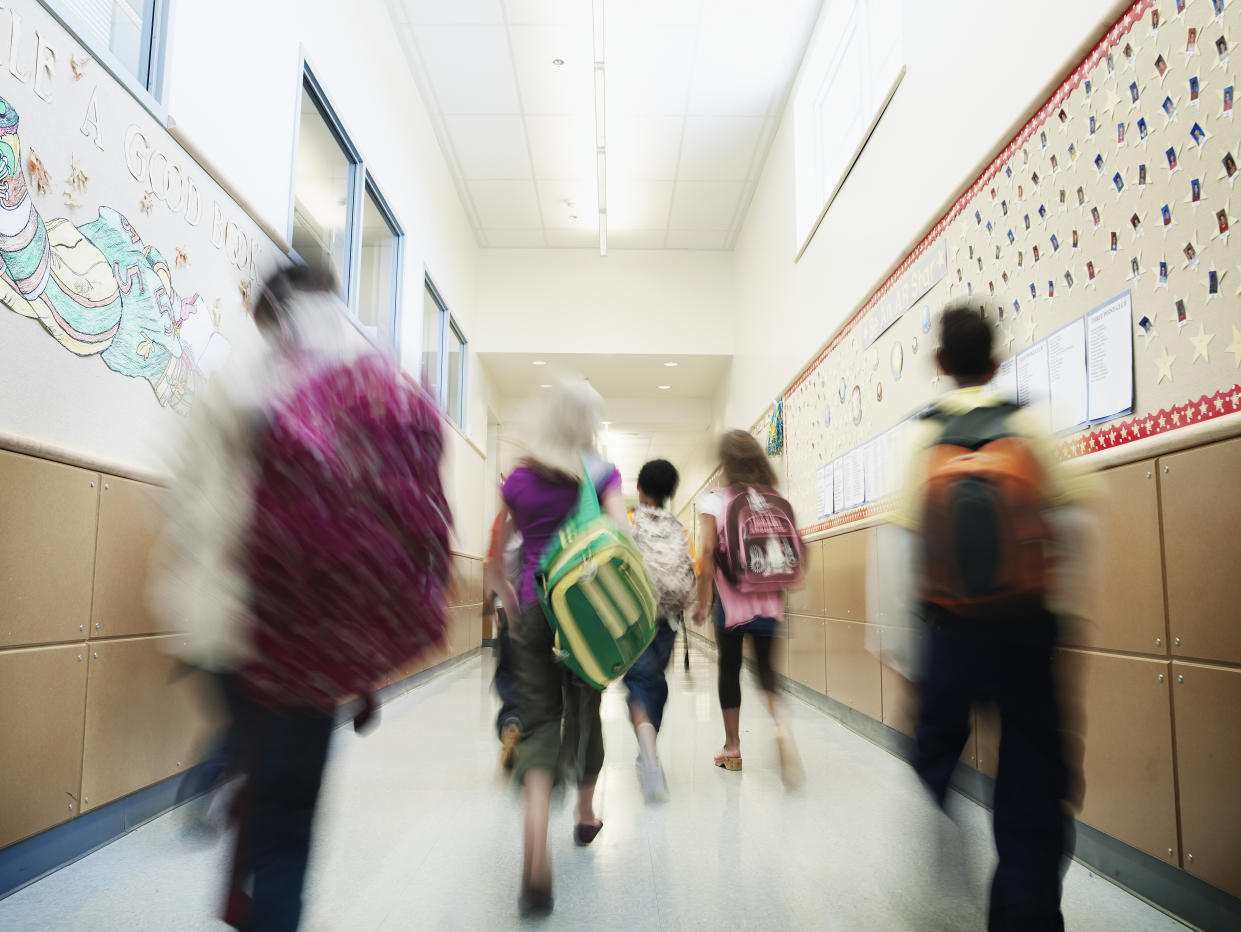
A new Yahoo News/YouGov poll finds that most Americans (52%) believe today’s K-12 students are receiving an “only fair” or “poor” education — in large part because an overwhelming number of Republicans (62%) think that U.S. education is “worse” now than when they were in school. Just 16% of Republicans say education today is “better.”
In contrast, Democrats are more than twice as likely as Republicans to say today’s K-12 students are receiving a better education than they did (40%) and less than half as likely as Republicans to say today’s education is worse (28%).
In light of the ongoing culture wars over how to talk and teach about race, gender, sexual orientation and U.S. history in schools — and the “parents’ rights” movement that has sprung up on the right as a result — such differences of opinion between Democrats and Republicans might seem inevitable.
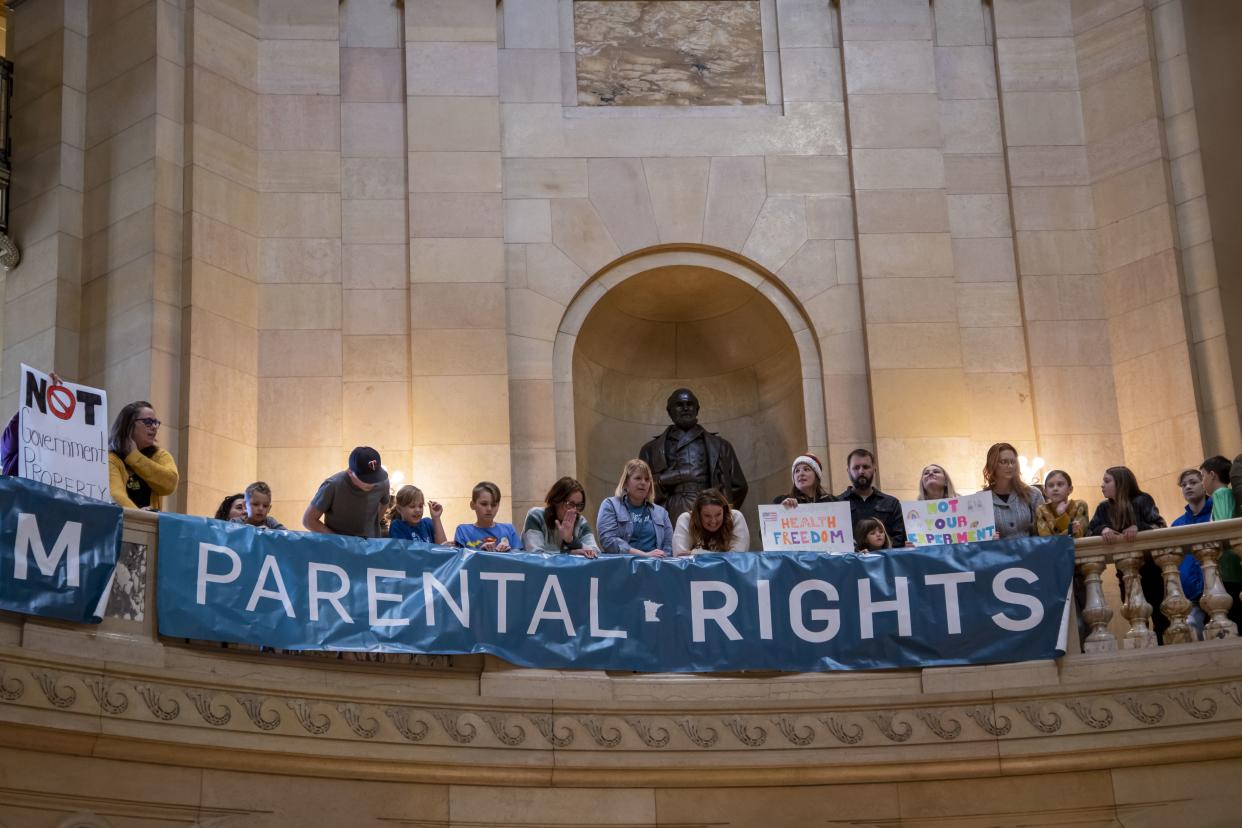
But they also reveal a deeper and more distressing divide. According to the Yahoo News/YouGov poll, faith in the American Dream — the ideal, embodied by education, that each successive generation will be better off than the one that came before it — is becoming increasingly polarized as well.
In other words, Republicans are not only much more likely than Democrats to believe American education is getting worse. They’re also much more likely to believe that American life is getting worse.
The survey of 1,555 U.S. adults, which was conducted from Dec. 15 to 19, shows a surprising level of agreement when Democrats and Republicans are asked to assess their own educational experience. Overall, more than three out of four Americans (77%) rate “the education [they] received” as “excellent” or “good,” while just 21% rate it as only fair or poor — with very little difference separating Democrats (82% positive, 17% negative) and Republicans (81% positive, 18% negative).
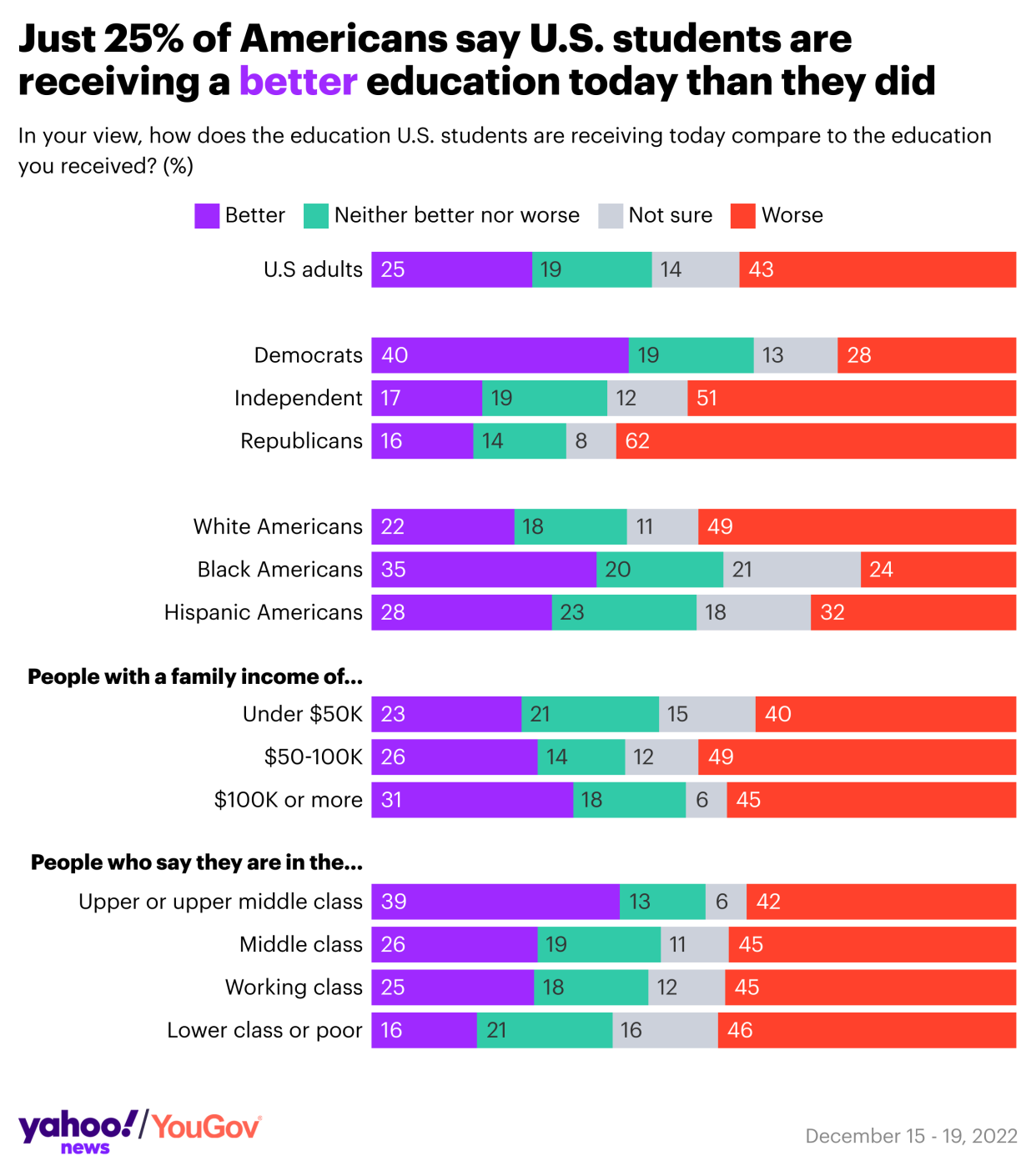
Meanwhile, Republicans (67%) are even more likely than Democrats (61%) to describe “the opportunities” that were “available to [them] after completing [their] education” as excellent or good.
But Republican attitudes change drastically when asked about education today.
In that case, a mere 31% of them rate current K-12 education positively — a full 50 percentage points lower than the number who say the same about their own education. And just 35% give a good or excellent rating to “the opportunities that will be available to U.S. students today” — about half the number who describe the opportunities that were available to them in those terms.
In contrast, majorities of Democrats give positive ratings to today’s education (54%) and opportunities (54%). Less than four in 10 — 39% and 34%, respectively — rate them negatively.
It’s tempting to attribute all of this polarization to the classroom culture wars that have gripped school boards and statewide elections in recent months. And the Yahoo News/YouGov poll certainly shows that Democrats and Republicans disagree about addressing race, gender, sexuality and even U.S. history in school.
For instance, two-thirds of Republicans (66%) identify “parents not having enough say over what is taught” as a “major problem”; just 26% of Democrats concur. Roughly the same number of Republicans are convinced that “the political viewpoint of what U.S. students are being taught in school today” is liberal (64%) rather than conservative (9%); Democrats, on the other hand, have no clear-cut view on the subject, with 19% saying it’s liberal, 22% saying it’s conservative, 29% saying it’s neither and 30% saying they’re unsure.
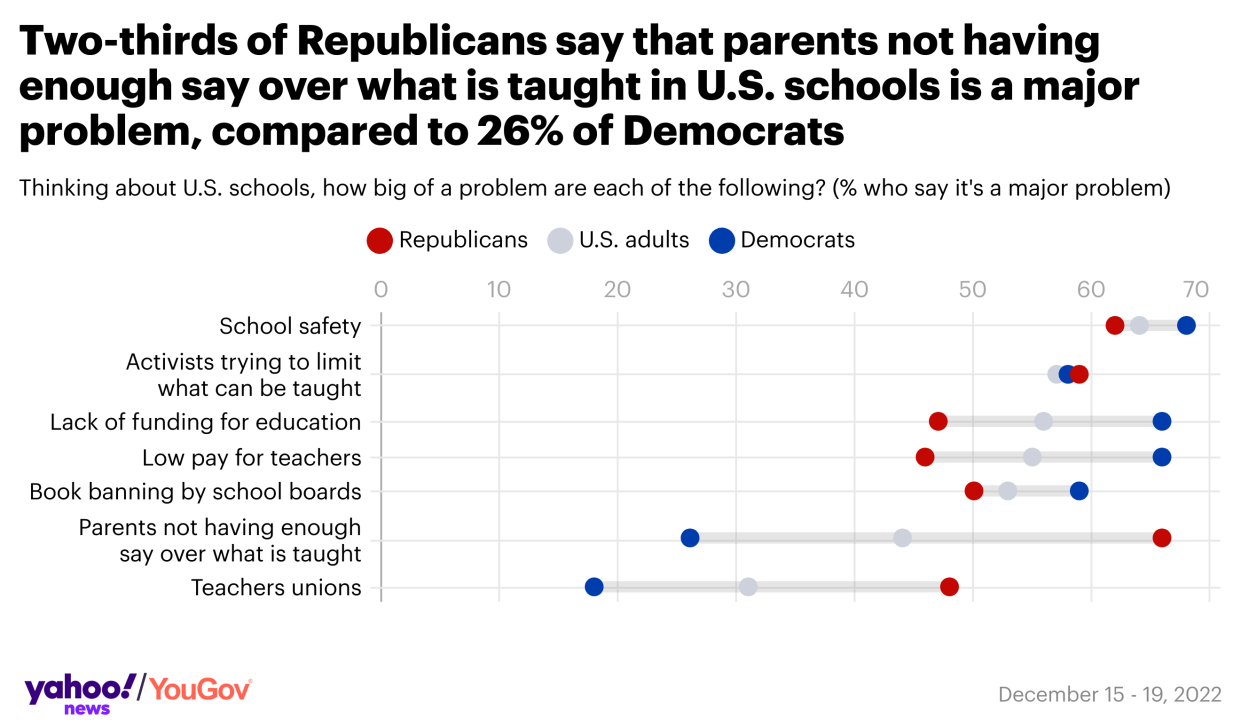
And when it comes to actual lessons on specific subjects:
A majority of Republicans say “the things students are learning about U.S. history” are inaccurate (55%) rather than accurate (33%), while a majority of Democrats take the opposite view (53% accurate, 29% inaccurate).
A larger majority of Republicans say “the things students are learning about U.S. race relations” are inaccurate (58%) rather than accurate (26%), while a plurality of Democrats take the opposite view (44% accurate, 36% inaccurate)
And finally, an even larger majority of Republicans say “the things students are learning about gender and sexuality” are inaccurate (61%) rather than accurate (22%), while, again, Democrats take the opposite view (44% accurate, 28% inaccurate).
For Republicans, all three of these pedagogical trendlines are moving in the wrong direction. When asked about the things they learned in school, few describe them as “inaccurate”: 13% for U.S. history, 20% for race relations, 10% for gender and sexuality. Instead, majorities of Republicans say their own lessons on these subjects — 82%, 56% and 51%, respectively — were accurate (with another 35% saying they didn’t learn about gender and sexuality at all).
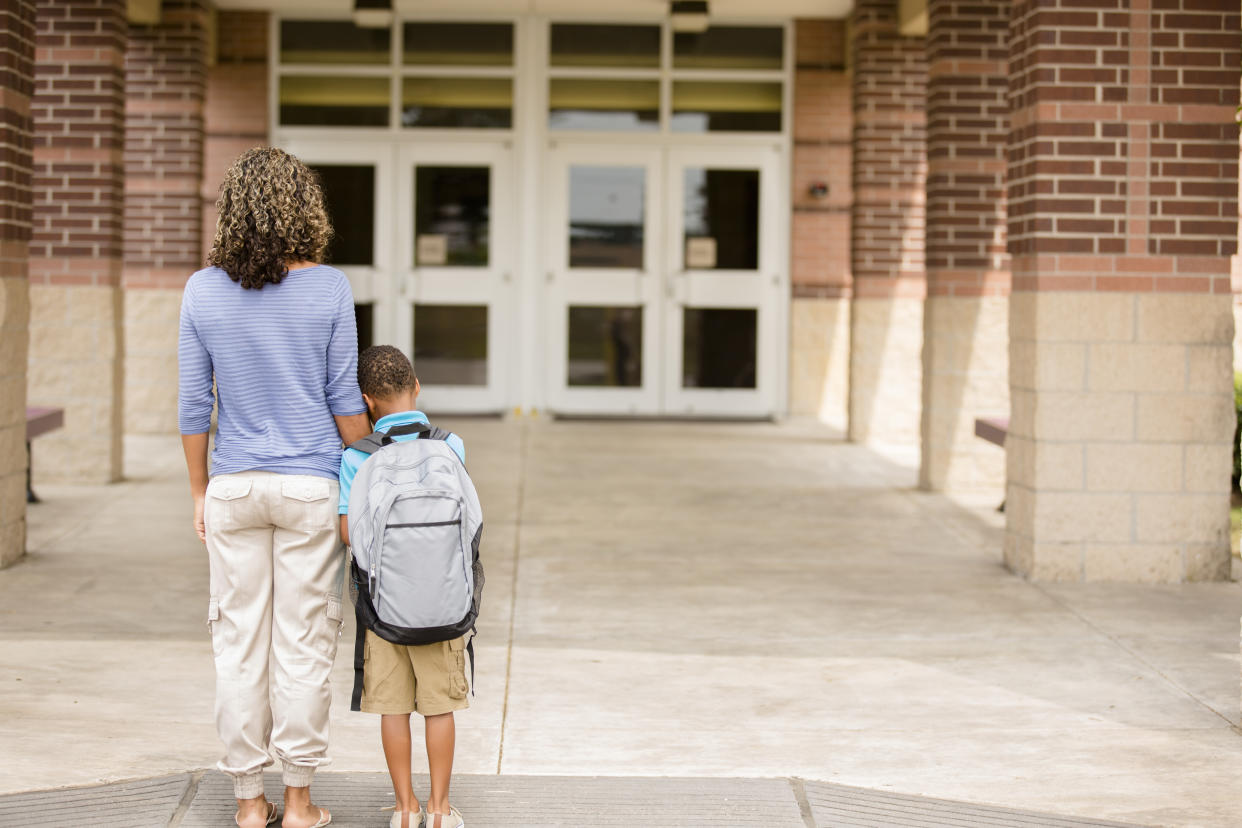
(Notably, most Republicans believe that’s still the best policy, with a full 66% of them saying that elementary school students should not learn about “any” topics related gender identity, sexual orientation, gay rights, trans rights or even general sex education, versus just 23% of Democrats who feel the same.)
But while the current classroom debates over race, gender, sexuality and U.S. history certainly contribute to America’s increasingly polarized attitudes on education, they may be symptoms of a deeper problem rather than the problem itself.
Consider how Democrats and Republicans answer questions about generational progress:
When asked if “you [are] better or worse off than your parents,” Democrats (43%) are slightly more likely than Republicans (39%) to say better, and slightly less likely to say worse (22% to 28%, respectively).
When asked if “the next generation [will] be better or worse off than yours,” nearly twice as many Democrats say better (44%) than worse (25%) — while nearly twice as many Republicans say worse (49%) than better (26%).
When asked if “you feel more or less proud of America” today than “when you were growing up,” a plurality of Democrats say “about the same” (44%) while a plurality of Republicans say they felt more pride in the past (48%).
And finally, Republicans (48%) are by 20 percentage points more likely than Democrats (28%) to say “America’s best days” are “behind us.”
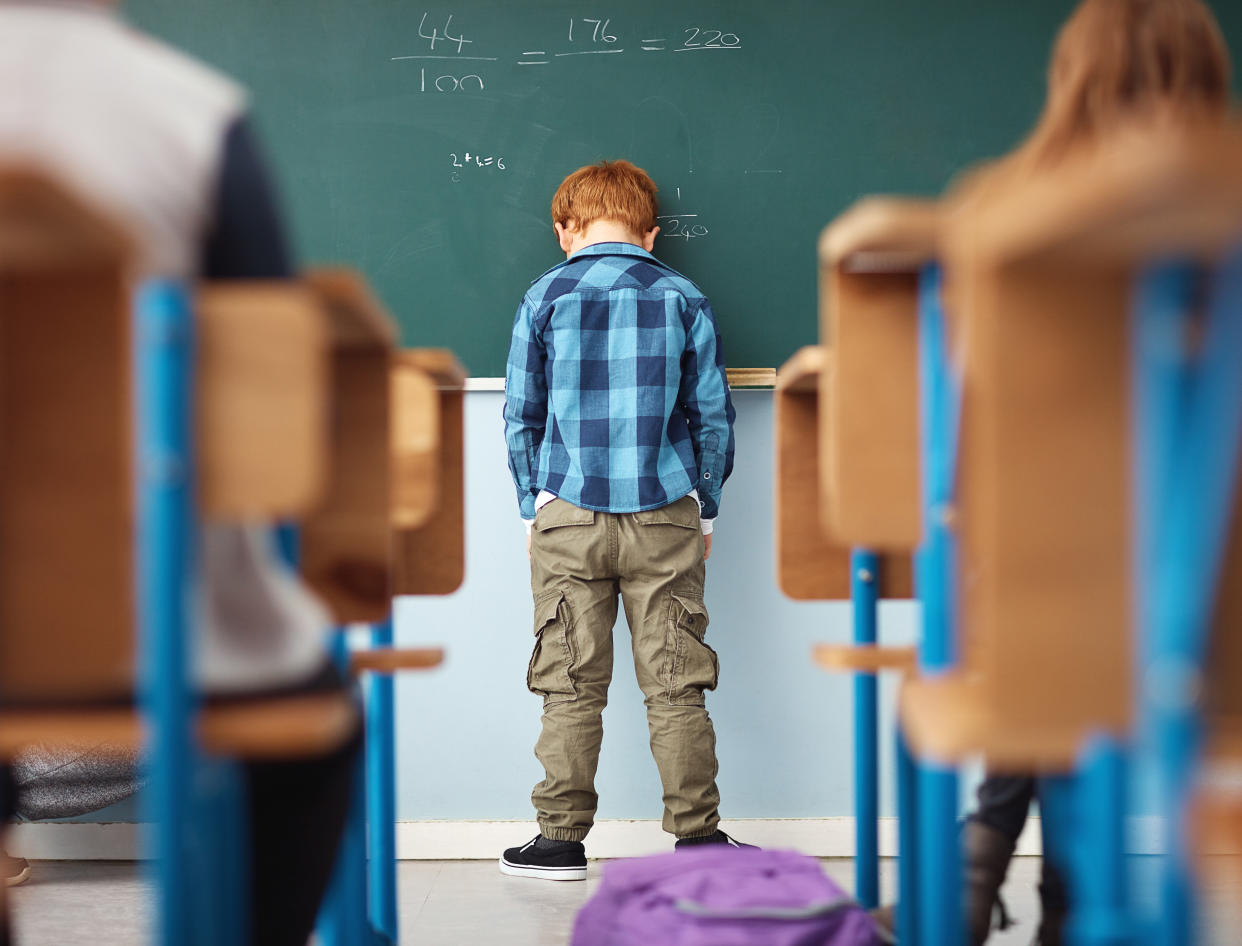
There are complex undercurrents of race and class embedded within this pessimism. White Americans, for example, are far more likely to predict that the next generation will be worse off (44%) rather than better off (28%), as are Americans who describe their social class as “lower class” or “poor” (47% worse off vs. 27% better off). But Black Americans (47% better off vs. 28% worse off) and Hispanic Americans (44% better off vs. 27% worse off) hold the opposite view by margins of 19 points and 17 points, respectively.
Likewise, positive ratings for education today are lower for white Americans (35%) than for Black (47%) and Hispanic Americans (43%); lower for those with family incomes under $50,000 per year (37%) than for those earning $100,000 or more (46%); and lower for those who describe themselves as lower class or poor (26%) than upper- or upper-middle class (48%).
In one particularly stark contrast, the share of white Americans who say education today is worse than when they were students (49%) is twice as large as the share of Black Americans who say the same (24%).
It’s hard to separate the question of whether American education — and by extension, American life — is getting better or worse for all Americans from the question of whether it’s getting better or worse for Americans like you. And that may be the crux of the conflict. Only 51% of Black Americans and 41% of Hispanic Americans describe the opportunities available to them after finishing school as good or excellent, versus 63% of white Americans. So it’s no surprise they’re more inclined to say things are better today than back then.
But issues of identity get tricky — and tend to exacerbate polarization — when they sort themselves along partisan lines.

Asked “how much influence … each of the following groups have in America,” a huge majority of Democrats say Black people have “too little” (60%). But very few Republicans (18%) agree. Instead, far more Republicans than Democrats say Black people have “too much” influence (26% vs. 11%) or “about [the] right” amount (43% vs. 23%).
In contrast, just 13% of Republicans say white people have too much influence in America — and they are twice as likely as Democrats to say that white people have too little influence (20% vs. 9%) or about the right amount (54% vs. 28%).
Today’s curriculum battles reflect the fact that the influence of “minority” Americans — whether characterized by race, sexual orientation or gender identity — has only grown over time. The new Yahoo News/YouGov poll suggests that increasingly polarized attitudes about the quality of not just American education but the direction of American life reflect that fact as well.
______________
The Yahoo News survey was conducted by YouGov using a nationally representative sample of 1,555 U.S. adults interviewed online from Dec. 15 to 19, 2022. The sample was weighted according to gender, age, race, education, 2020 election turnout and presidential vote, baseline party identification and current voter registration status. Demographic weighting targets come from the 2019 American Community Survey. Baseline party identification is the respondent’s most recent answer given prior to March 15, 2022, and is weighted to the estimated distribution at that time (32% Democratic, 27% Republican). Respondents were selected from YouGov’s opt-in panel to be representative of all U.S. adults. The margin of error is approximately 2.7%.
